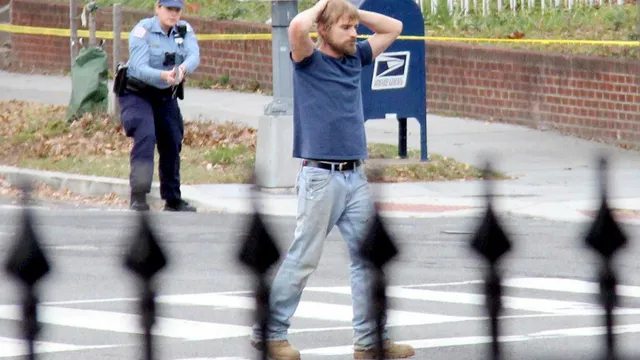
Pizzagate gunman Edgar Madison Welch dies in standoff with police
2025-01-10 15:11- Edgar Maddison Welch was known for firing shots at a restaurant in Washington, D.C., in December 2016.
- He was shot by police during a traffic stop after brandishing a handgun when approached for an outstanding warrant.
- The incident underscores the lasting consequences of conspiracy theories and their impact on individuals' lives.
Express your sentiment!
Insights
In the United States, Edgar Maddison Welch was involved in a high-profile incident related to the debunked 'Pizzagate' conspiracy theory in December 2016. Welch traveled from North Carolina to Washington, D.C., where he entered the Comet Ping Pong restaurant armed with an assault rifle and a revolver, believing in a fake narrative that the restaurant was part of a child trafficking ring operated by prominent Democrats. After he fired shots inside the restaurant with no injuries reported, he later surrendered to law enforcement. Welch was subsequently convicted and sentenced to four years in prison for his actions. On January 4, 2025, Welch was fatally shot during a traffic stop in Kannapolis, North Carolina. Police had recognized the vehicle he was in, which was linked to an outstanding warrant for felony probation violation held against him. As police approached to arrest him, Welch brandished a handgun and pointed it at an officer. Despite orders to drop the weapon, he refused, leading to two officers discharging their firearms, resulting in Welch suffering serious injuries. Emergency responders transported him to a local hospital, where he succumbed to his injuries two days later. The North Carolina State Bureau of Investigation is currently reviewing the circumstances of the shooting, and the officers involved have been placed on administrative leave as part of the standard protocol following such incidents. Welch's identity as the individual from the 'Pizzagate' incident was confirmed by officials. The repercussions of the 'Pizzagate' conspiracy theory continue to affect many lives. The initial claim sparked widespread threats and significant distress to the staff and customers of Comet Ping Pong, showcasing the dangers of misinformation circulating online during a politically charged environment. Welch’s tragic end serves as a reminder of the extreme actions that individuals motivated by conspiracy theories may take, further highlighting the need for responsible consumption of media and discernment of truth in a complex digital landscape.
Contexts
The Pizzagate conspiracy theory emerged in late 2016 during the United States presidential election and is centered on the claim that a child trafficking ring involving high-profile political figures was being operated out of the basement of a Washington D.C. pizzeria called Comet Ping Pong. This theory gained momentum through social media platforms and fringe websites, with proponents circulating misinformation based on hacked emails from John Podesta, Hillary Clinton's campaign chairman, which were published by WikiLeaks. The emails contained benign references to pizza and other foods, which were later misinterpreted by conspiracy theorists as coded language for human trafficking and pedophilia, leading to a rise in public speculation and anxiety around these unfounded allegations. The proliferation of this theory highlighted the detrimental effects of misinformation on public discourse and the potential consequences of unfounded claims when disseminated widely without factual basis. As the Pizzagate narrative spread, it prompted harassment against the pizzeria and its staff, drawing unwarranted attention and threats from conspiracy believers. In December 2016, a significant incident occurred when an individual armed with a rifle entered Comet Ping Pong, discharged a firearm, and claimed he was investigating the conspiracy allegations. This act of violence underscored the real-world dangers that can arise from spreading conspiracy theories, showcasing how dangerous paranoia and misinformation can become when not properly challenged. Law enforcement responded swiftly, reinforcing the importance of moderating conspiracy claims with factual evidence and educating the public about potential threats stemming from viral misinformation. Investigative journalism and fact-checking organizations made efforts to debunk the Pizzagate conspiracy, illustrating how the claims surrounding it were baseless. Multiple news outlets and platforms worked collaboratively to address the fallout from the conspiracy theory, revealing that no evidence supported the outrageous claims about Comet Ping Pong or any other entity involved in the theory. Furthermore, prominent figures in law enforcement emphasized that the allegations lacked any credible evidence and highlighted the importance of cybersecurity and vigilance against organized disinformation campaigns. In subsequent years, Pizzagate has continued to serve as a cautionary tale about how rapidly misinformation can spread through digital platforms, inciting fear and leading to dangerous actions. As more users become aware of the need for critical thinking and media literacy, there is an ongoing dialogue about the responsibility of social media and internet companies to manage and mitigate harmful false narratives. The legacy of Pizzagate reflects broader societal issues regarding trust in institutions, the impact of digital communication on public perception, and the ethical implications of sharing unverified claims.